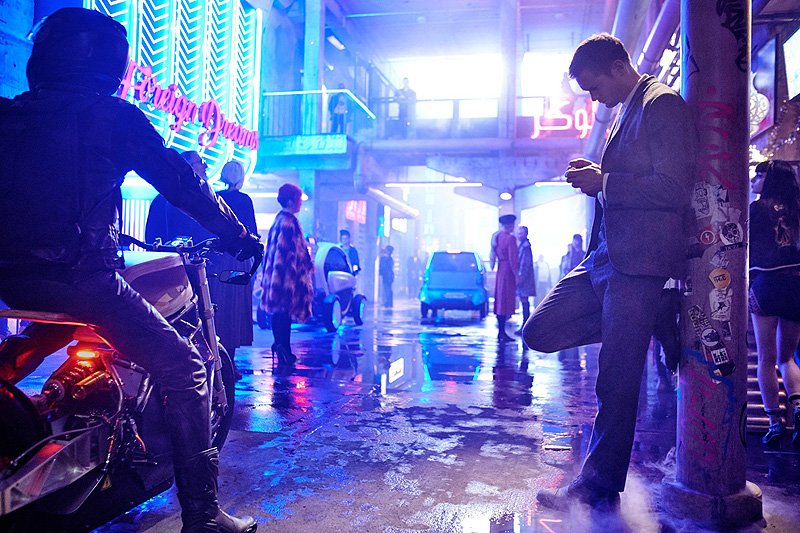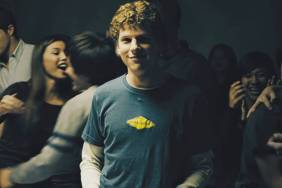ComingSoon.net chatted with filmmaker Duncan Jones (Moon, Source Code, Warcraft), whose futuristic sci-fi thriller Mute is now available on Netflix. During our conversation, we discuss how Jones’ conception of the film changed over its 16-year development, how it connects to Moon, and what his experience on Warcraft taught him.
The sci-fi noir film Mute stars Alexander Skarsgård (Big Little Lies, The Legend of Tarzan, War on Everyone), Paul Rudd (Ant-Man and The Wasp), Justin Theroux (The Girl on the Train, The Leftovers) and newcomer Seyneb Saleh.
Berlin, the future, but close enough to feel familiar: In this loud, often brutal city, Leo (Skarsgård) – unable to speak from a childhood accident – searches for his missing girlfriend, the love of his life, his salvation, through dark streets, frenzied plazas, and the full spectrum of the cities shadow-dwellers. As he seeks answers, Leo finds himself mixed up with Cactus Bill (Rudd) and Duck (Theroux), a pair of irreverent US army surgeons on a mission all their own. This soulful sci-fi journey from imagines a world of strange currencies in which echoes of love and humanity are still worth listening to.
The Netflix original film was written by Jones and Michael Robert Johnson (Sherlock Holmes). Stuart Fenegan served as producer and Charles J.D. Schissel and Trevor Beattie as executive producers.

ComingSoon.net: I liked that your protagonist is not only mute but he’s pretty much a novice in the action hero department, and spends a majority of the film taking beatdown after beatdown. Was that always a part of your conception of Leo? What did Alex bring to the equation?
Duncan Jones: Yeah, I think the idea was always that he was a bit of a farm boy who is thrown into this hero thing. It’s really because he starts pulling on a thread that he can’t resist. He’s looking for his girlfriend and the more he looks the worse the scenario seems to be becoming, until he finds out what happens. Working with Alex was great. I always knew that it was going to be a very challenging role. I wanted to give whoever ended up playing the part a real challenge. I’d seen Alex in “Generation Kill” and he was fantastic in that. He was incredibly talented, and I wanted to work with someone who had the physical presence I needed for Leo, but also who would be able to perform at that level and make the character believable and make the audience care about them without using dialogue as a crutch.
CS: So for the setting, of all the places on Earth, why choose Berlin? Besides tax incentives?
Jones: (laughs) It wasn’t that much of a tax incentive, I think there were probably much better ones in other places. I’ve had a unique relationship with Berlin over the years. My dad was working there back in the 1970s, so I had a chance to live there for just over a year when the Cold War was still on and the wall was still up and Berlin was this isolated little island of western civilization in the middle of the Soviet Union. I remember Berlin like that and I managed to go back to Berlin over the decades since then and seen how incredibly fast it has changed with the unification of Germany and the mass immigration that Angela Merkel has helped happen, and just what a dynamic city it is. Of all western hemisphere cities I’d say it’s the city most focused on the future and looking at what’s gonna happen, as opposed to feeling content with the present or dwelling too much on the past.
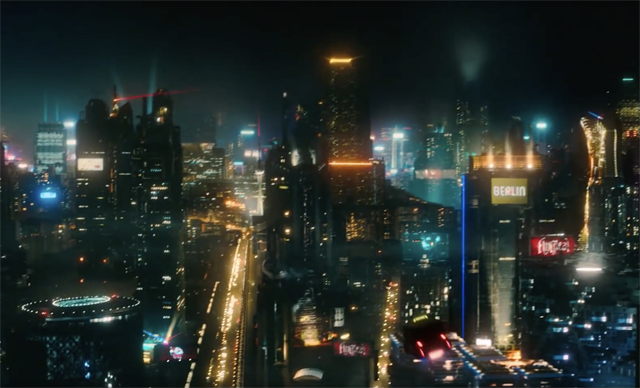
CS: The atmosphere in “Mute” is a Casablanca-esque melting pot of expats, with the background being this forever war fought in the desert that soldiers are going AWOL from. Was that something that was sparked in more of the Bush era or do you still see that as the direction we’re still headed?
Jones: It’s funny, you’re right. I wrote the thing 16 years ago, so it was a very different time when I originally wrote this, but the fact is there’s still conflicts going on in the middle east, there’s still American military bases all over Germany. (laughs) That seems very likely to be the story into the future. We’ll see how long it lasts, but if that continues to be the case, imagining that there are going to be certain members of the military on leave or on downtime in Germany who may decide, “Forget this! I’m gonna take off!” doesn’t seem that impossible to believe.
CS: Not at all. The film correlates to a Philip K. Dick-ian vision of the future, where things are different but not that different, and people still relate to each other the same and have the same hangups and neuroses. What were some of your inspirations, besides “Blade Runner”?
Jones: I think one of the things that was key to me was I didn’t want technology to be the be-all, end-all of what made this future. It’s really about, “Is this a believable future Berlin?” Drone delivery of food really doesn’t seem that far off.
CS: Amazon already has test facilities for that in the UK.
Jones: Exactly! And having refrigerators that tell you what’s inside, Samsung are doing that right now. In a way it’s more about making the technology de-facto and what’s expected as opposed to what’s on the forefront. It’s more about making it feel normal and part and parcel of what that world is.
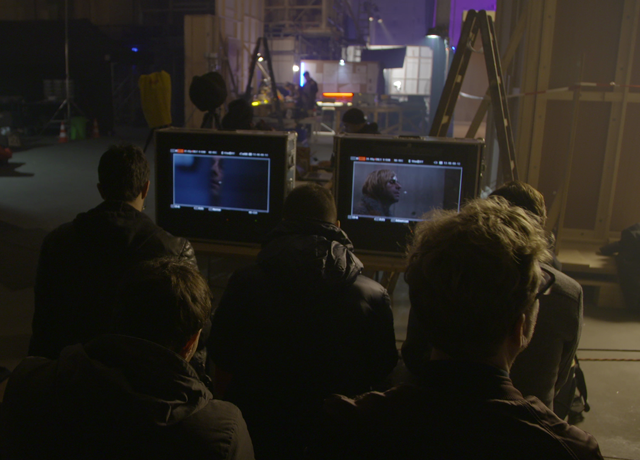
CS: This was a passion project that you nurtured for a long time. It pre-dates “Moon.” What would you say is the biggest difference between what was in your head all these years and what finally wound up onscreen?
Jones: You’re right, I had a huge amount of time to gestate and change over 16 years. A lot of those changes were not what I wanted to write in a conscious way, but more how the world had changed, how I had changed, having made three other feature films. What was going on in my personal life with the deaths of family members and the birth of my son. Parenthood was always part of the script of “Mute,” but because of what was going on in my personal life it certainly became something that was more on the surface of the film and more important to me in terms of what I prioritized in the film.
CS: “Mute” is interesting because it’s not by any stretch of the imagination a four-quadrant movie. It has its own language and point of view.
Jones: Thank you. That’s what I’m trying to do. Even in “Warcraft,” which was my diving into the studio machine of filmmaking, I’m trying to find ways to bring as much of my own voice into what I do as possible. Otherwise, I don’t see why I would want to do it. My vision as a filmmaker is not entirely about where I choose to put the camera, but it’s about trying to inject my understanding of humanity into characters we’re trying to tell a story about.
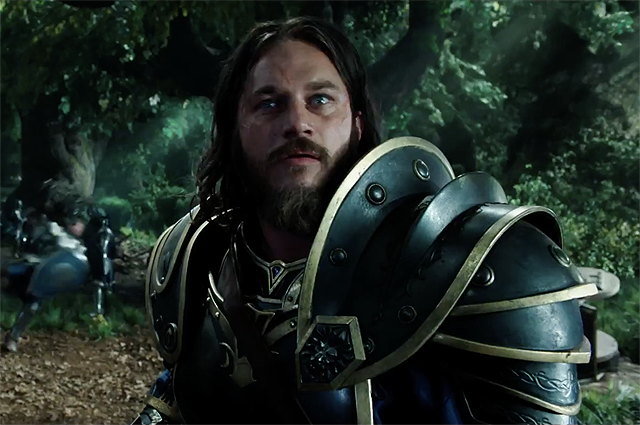
CS: That’s certainly what I appreciated about “Warcraft” because it could have been just another Tolkien rip-off, but instead you humanized the orcs and made them arguably the more sympathetic creatures in the film. One of the things I have to say I really truly love about that movie is that, by and large, everyone in the film is turning in a fairly serious, straight performance… except for Travis Fimmel, who -as far as I can tell- appears to be on peyote. He has this off-the-wall, wild-eyed, almost maniacal expression, and sometimes during scenes he’s just kind of staring at the ceiling of the studio. Was that anachronistic performance something you encouraged or did that just kind of happen?
Jones: (laughs) Travis is a unique dude. I think you kinda try to… guide him as best you can, but he’s gonna be Travis. (laughs) He’s incredibly charismatic, and if you can channel it into what he wants to do then you’re in good shape. If you try to force him to do something he doesn’t want to do you’re gonna come unstuck. I think that was my experience with Travis. If you can find a way to both see it the same way and help him with some of his choices you’re probably gonna have your best luck there.
CS: You’ve spoken of your experience making “Warcraft” as being a “death by a thousand cuts,” so if you were to take on another big franchise tentpole type film what would be the ideal circumstances for you to sign on?
Jones: For studio films in general or “Warcraft” in particular?
CS: Just another big tentpole in that vein.
Jones: For another tentpole, if they were pre-existing franchises I don’t think I’d want to do them. If it’s something they want to become a franchise but is new I would obviously be more interested. Part of the enjoyment for me is trying to find a way to create and realize something from scratch. That part of it I would be more interested in. As far as doing a big studio film, I think more communication upfront about what it is we hope the project will be and agreeing on that upfront. “Warcraft” was a unique circumstance with no way around it. Too many voices, only because that was the nature of “Warcraft.” Blizzard are a company making a billion dollars a year just off the games. The movie was small potatoes for them. It really wasn’t their priority. The game is how they pay their employees, not the movie. So for them the movie really had to serve the game, as opposed to the game and the film being separate things. Then there were also multiple studios, Legendary were originally part of Warner Bros. and then moved to Universal. Then Legendary itself was bought by Wanda from China, there were producers changing during the course of the film. It was a very messy political situation. I would hope that even if I did another studio film it wouldn’t be as fluctuating as that one was.
*SPOILER WARNING*

CS: Can you explain what’s going on in the courtroom scene on the TV with Sam Rockwell’s Sam Bell from “Moon”?
Jones: The idea is “Moon” and “Mute” are on this shared timeline, but only in the most superficial way. There is a globally interesting story on what happens to Sam Bell when he gets back to Earth. It’s basically the news story of the moment that happens to be playing out in the background of what’s going on in “Mute.” There’s a court case going on where the vast cargo Sam Bells from “Moon” are basically free and back on Earth. They’re in a court case where it’s being decided if they are to be treated as individuals or corporate property. That’s what the Sam Rockwell cameo is all about.
CS: Is that also going to lead into the third film in this trilogy or is that just a throwaway gag?
Jones: The best way to think about it is “Moon,” “Mute” and this third film are part of an anthology of three stories that happen to take place in the same timeline. They’re not directly connected but they are aware of each other, if that makes sense.
Mute is now streaming on Netflix.
Mute
-
Mute
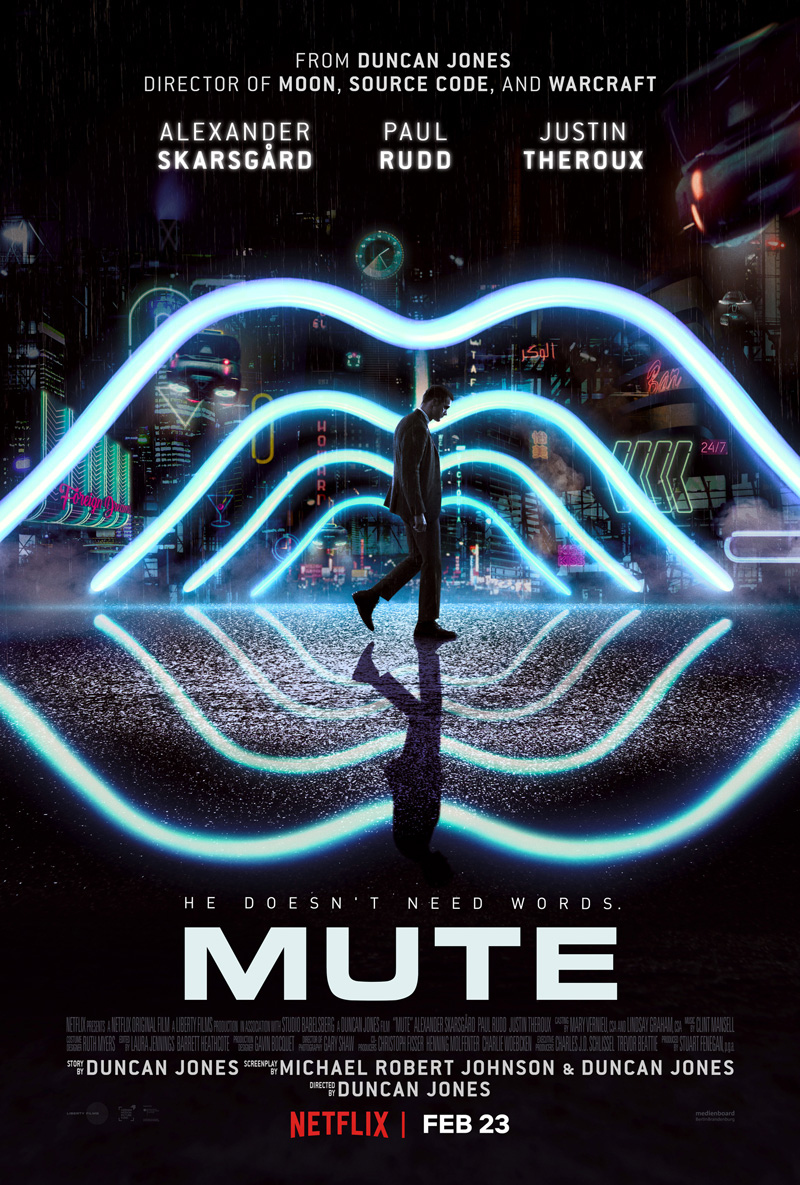
-
Mute

-
Mute

-
Mute

Mute
-
Mute

